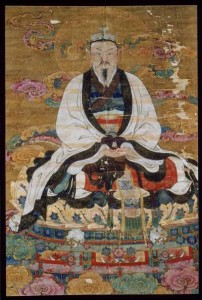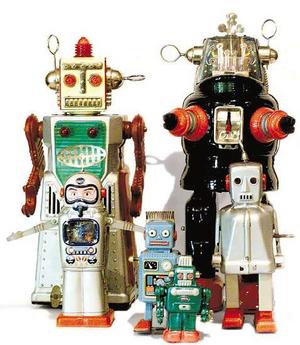No Word for Trance in Chinese
/ The Jade Emperor
The Jade EmperorIf I want to avoid using a “Western” construct to explain or understand Chinese martial culture, I’m going to have to avoid using the term trance. Chinese culture does not appear to have two terms which are the equivalent of trance and possession They only have a term which means possession by a god, demon, or the dead.
There are expressions which point at trance. For instance, dancing demon general troops sometimes use expressions such as, “We feel the gods marching along with us.” There are also terms like “shi,” potency, “ling” efficaciousness, and “shen” spirit, which are used to imply various types of embodied power. (Any readers out there with better language skills are welcome to add to this short list.)
I’m tempted to invent a new term like “sacred physiological state.” I know other people have stumbled down this path, I think there is a Wiki page on ‘states of consciousness,’ and UCSC still has a ‘History of Consciousness’ program.
Fundamentally I believe I’m running into the epistemological debate which is at the foundation of the difference between European and Asian Cosmologies. Namely that external agents cause events (European), verses, all events/things are mutually self-recreating (Asian). The idea that there are external agents responsible for what happens requires that we create a continuum of effect, a measure of just how much a particular agent exerted itself on another agent. Thus we make a distinction between someone in a trance (only partly in control) and and someone possessed (fully in control). In a Cosmology without external agency, there is no need for a continuum of effects. A god can only have an effect on you because you are already part of that god. A god can only have an effect on you, if you have an effect on him as well!
Possession in Taiwan is not common, though it does happen spontaneously, and it can happen to bystanders at rituals. Possession mainly happens to people who have taken on a role and an identity as a representative of a god, these are known as Tangki. Female mediums who regularly provide the service of speaking directly to a persons ancestors on their behalf, sometimes speak ‘as the deceased.‘ In these cases they are possessed. When someone is possessed in Taiwan, they loose their memory of the event. That seems to be part of the definition, does anyone out there know of a contrary example?
 Humans?
Humans?I think it is reasonable to presume that at times in the past, possession was much more common. Particularly in times of famine. Or times of plague and infections epidemics. Perhaps even in other times, like before or after mass acts of violence. I would like to know if the incidence of possession will go up over the next couple of years in response to the hurricane that struck Taiwan this summer.
Are there actually different types of trance? I was talking with a demographer in Taiwan who told me that studies about the effects of stress use the expression ‘The Four F’s.’ (Fight, Flight, Freeze, and Intercourse.) They also have two more they use to describe the stressed behavior female mammals, Care and Corral. These are all being understood as functions of the endocrine system, as a combination of hormones.
So perhaps, in the not too distant future, we will be able talk about types of trances as particular functions of the endocrine system. And instead of traditional Chinese notions of ghost/demon/god possession, we can talk about humans as robots.
Yes, robots. The science of physiology, the study of anatomical function, is quickly heading in the direction of declaring that we are robots. Free will appears to be an illusion, disconnected from what we actually do. Consciousness is actually fated. Awareness is just a biological mechanism.
I’m sorry to end this post here, but it is now impossible to know if anything I’m saying is novel.
Okay, one more thing. It seems likely that fighting in a life or death situation, particularly to the extent that it involves surprise, happens so fast that the conscious mind is often not even there to record events. Even in matched or staged fights it is normal to experience an altered or irregular sense of time and space. Keeping this fact in mind, isn't it obvious that martial arts training is an attempt to train our robot nature?
